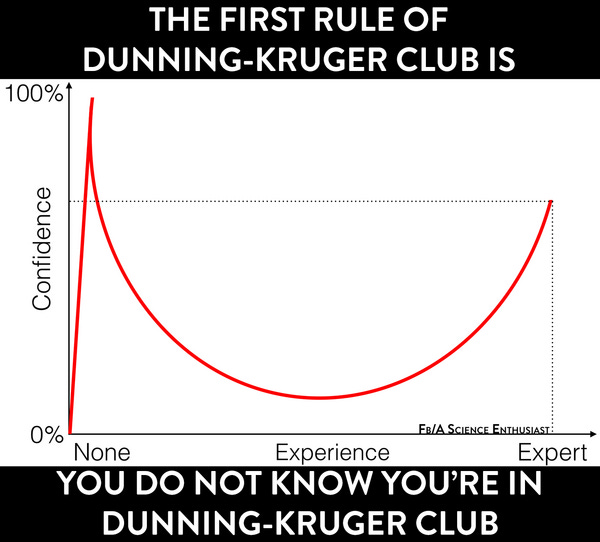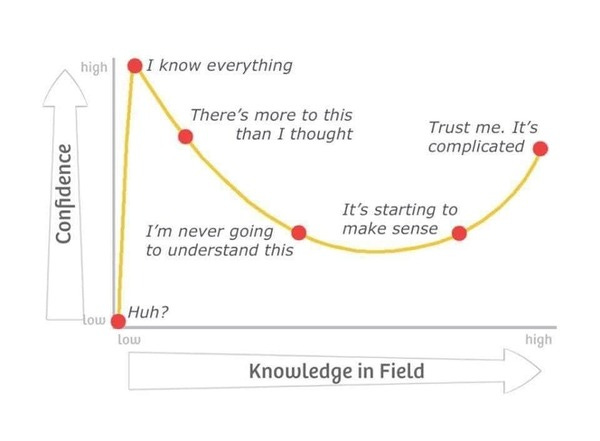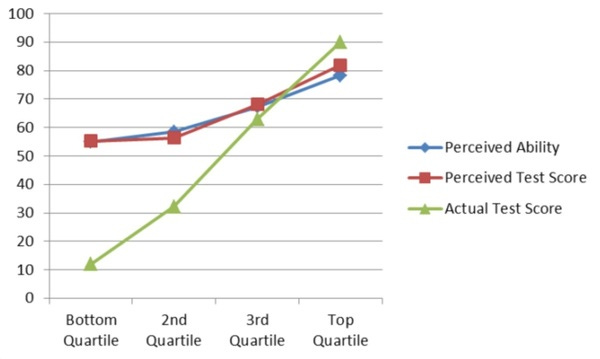Solving Dunning-Kruger Effect
What people get right (and wrong) about the Dunning-Kruger Effect.
Solving Dunning-Kruger Effect
Video overview:
An example of the negative impact of Dunning-Kruger Effect when left unmitigated and allowing bottom quartile personnel to mismanage things:
“When I was shooting competitively, my goal was to get as good as most people thought they were.”
TL;DR/BLUF: Go shoot a match or participate in something outside your unit, department, or immediate group of friends once in a while. If you don’t, you’re almost certainly a victim of Dunning-Kruger Effect and won’t be able to realize it.
Dunning–Kruger Effect is a cognitive bias in which people of low ability or skill in a given area maintain illusory superiority and mistakenly assess their ability, skill, and/or experience as greater than it is. The cognitive bias of illusory superiority comes from the inability of low-ability people to recognize their lack of ability. Without the self-awareness of metacognition (an awareness and understanding of one’s own thought processes), low-ability people cannot objectively evaluate their actual competence or incompetence in that field of expertise.
Dunning–Kruger Effect impacts all humans. Everyone, including you and me, is susceptible. It has been recognized by many people throughout human history but Dr. David Dunning and his graduate student Justin Kruger formally established a variety of test methodologies to measure this phenomenon and published a research paper about their findings.
David McRaney hosts the excellent You Are Not So Smart podcast. He recounts when he first realized the Dunning-Kruger Effect impacted him.
I remember the first time in my life that I really recognized that [Dunning-Kruger Effect] was true.
In college, I staged a fighting game tournament where I set up all these video game systems and I invited people from around the country to our university to play. We had a group of friends – it was like, 8 to 10 people in our hometown who played this game - and we thought that we were amazing at it. We thought that we were the best in the world and I had no problem inviting the champions at this game from around the country to come to play against us.
Every single one of us lost our matches immediately. Like, we didn’t even place. We didn’t even come close. We were absolutely destroyed. And I remember all of us sort of shaking our heads and rubbing our temples and thinking, “How could we not just be not okay but actually suck? I mean, how is that possible?”
I bet that sort of thing happens a lot amongst people who are sort of at the amateur level and feel that they have achieved something.
Every human is susceptible to Dunning-Kruger Effect. The challenge is to be willing to find the means to overcome it. Because this is a cognitive bias - a mistake in reasoning, evaluating, and/or remembering - nobody can reliably do it on their own. As McRaney’s example illustrates, it was only after he and his friends organized a tournament, invited everyone interested and thought they were good, and measured the results that he finally snapped out of his delusion of competence.
Dr. David Dunning confirms this is the path to solving Dunning-Kruger Effect.
“Why don’t people know themselves?”
You begin to realize that there are just some really big barriers to knowing yourself. That’s if you make it a private task that only you are engaged in. If you don’t talk to [and engage with] other people.
If you talk to other people, they can be sources of invaluable insight into yourself. Some of these insights may be unpleasant. Also, just watching what other people do and benchmarking what you do versus what they do can be a source of insight. It takes a village, if you will, for a person to know themselves.
We engaged in a number of studies where we exposed people to others who are performing very poorly to performing extremely well and what we find is that the collective is pretty good at knowing who’s bad.
A last hint is to ask, “Are you vaguely embarrassed by things you did 5 or 10 years ago?” And if you are, that means you’re improving. I mean, if you think about the self you were 10 years ago and you’re not embarrassed by something that you did, you might be off the task.
Here are some popular examples of how some people wrongly interpret Dunning-Kruger Effect:
While there’s some truth in the above charts, neither ever appeared in any of Dr. Dunning’s published research and were, rather ironically, made by people who thought they fully understood Dr. Dunning’s work but did not.
An example of a chart that has appeared in Dr. Dunning’s work:
As measured ability/knowledge improves in a given area, so does the awareness and accurate self-estimate of that ability/knowledge. People in the Bottom Quartile recognize they’re not as good as others, but still tend to overestimate their ability as they lack sufficient domain knowledge to correctly self-assess. Better performers in that field have an increasing level of knowledge therein, which also includes the ability to better self-assess. The top quartile will tend to underestimate their measured ability/knowledge as they know enough to recognize what they still don’t know.
Another way to consider this: a majority of people will self-assess they’re “about average” regardless of which quartile of skill/knowledge they’re actually in.
It’s worth pointing out that it is wrong to believe the D-K Effect applies only to people with a generally low intelligence level. The D-K Effect applies to everyone in any area of knowledge they’re inexperienced in. Many people who bring it up seem to think that it applies only to dumb people and believe they’re smarter than smart people. That is not true. If you think it only applies to other people (which itself, ironically, is part of the D-K Effect) then you miss the core lesson and opportunity for self-improvement and critical thinking. Highly intelligent people who are very skilled in multiple areas can still experience D-K Effect in other areas they’re inexperienced and unskilled in.
Another Bottom Quartile example found in the wild that was posted in 2019 referencing out-of-date U.S. Army small arms training doctrine (the obsolete Four Fundamentals model) after it had been formally redacted and replaced in 2016.

Many military personnel, including drill sergeants and NCOs, are in the bottom quartile of knowledge and skill among shooter-instructors and remain unaware of how low-skilled they are in that field, to the point of being ignorant of their own service’s doctrine. This has been verified in multiple formal studies and reports by Army Research Institute and others:
Studies discussed in this video:
More:
https://theness.com/neurologicablog/index.php/misunderstanding-dunning-kruger








Wisdom from Pete Platt:
"Got a real education when I started shooting pistol Bullseye. Thought I was a half way decent shooter. Then tried Bullseye… and everything just crashed,. I'm still working out the bugs. Haven't got it yet. I can hit at 50 feet,,but not consistent or accurately. 10's count, everything else is mediocre."